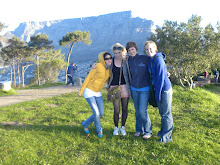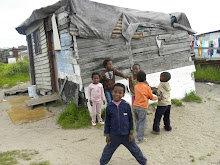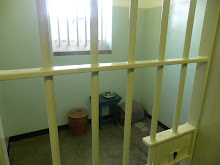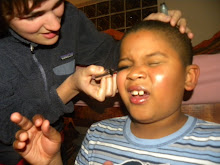My experience here in south africa has been challenging: witnessing with the disparity I've already discussed, engaging with the issue of race and the associated legacy left by my fellow white people in this nation, the now normal anxiety regarding crime and safety, and the constant sense that I am a guest, an intruder in my host family's home. It's almost as if introverts like myself don't survive here. Darwin's rule, natural selection, has pushed us out of the cycle of reproduction as the conditions are not ripe for my kind in south africa. to travel alone, to retreat into one's head, to not only desire but need solitute to function, is dangerous in this country. Thus I struggle. How do I engage with such suffering everyday, in combination with my own sensitivity, without become an emotional and psychological wreck?
I find myself drinking a lot. mmmmm savvanna hard cider. One night after work...ok then maybe two...to escape from the dissapointment I feel...for my fellow man...and for myself. There's blood on my hands, on all of ours'. We want to think we live in a bubble. We claim that we don't overtyl harm our fellow man.
Sunday, October 25, 2009
Sunday, October 18, 2009
A Star That Won't Play False To Me
It's almost 3am in my quiet neighborhood of Southfield.
I'm dreaming of paragliding off Lion's Head when I remember that story my whale watching tour guide told me about a man who bought his wife a tandem paragliding trip off of the same mountain for her 40th birthday.
They caught a bad air rift and slammed into the side of the mountain.
Hanging there...with her 2 broken legs against the rock face...waiting for 4 hours for paramedics and a helicopter to get to them.
"Happy Birthday sweetheart"
The squeal of car tires and blasting of anothe lame Akon song creeps into the soundwaves of my dream
BAM.
I awake with a start. Not to see Emeril from the food network sauteeing mushrooms in my bedroom, but to the sound of metal crunching against a concrete security wall. A car just ran into the security wall of the apartment complex across the street. No one's hurt but there's a huge gaping hole in the wall. Oooo dear.
-----------------------------------------------------------
Things at work are frustrating. The way are office is structured is positive in that it allows one to be exposed to and gain a deeper understanding of such a broad range of human rights abuses in this country. But because we don't specialize in a specific area, any attempt to do so is done through partnership with another organization. Communication here is a bit slow, so by the time you set up an initial meeting and arrange your tasks, you have only a month or 2 left. You already a foreignor with relatively little understanding of the culture and issues that organization is addressing, and are thus essentially seen as an "add-on" to which they understandably can't devote much time or energy into training. So while I'm grateful for the understanding I now have of so many facets of South African society and the range of experiences I've had (planning panels on gender based violence, supporting a transgender educational drag show, going on the radio to talk about service delivery pertaining to gender based violence, consulting refugees on their status, meeting with former sex workers, etc.), at some point I'd like to develop the skills to act upon such understanding.
It's so easy to get frustrated with oneself here. To so engage so deeply in another person's suffering, though I can never fully understand it, but to feel so unequipped or unqualified to respond in any real impactful way. I just constantly have to remind myself of where I come from. That really this office is structured so that the greater impact is on us as interns who are given the foundation to create the lasting change we all really want to see in the future. So many interns come into this office wanting to "make a difference," but from where we come from and the skills we have, not only are we realistically limited, but we must realize our role as students of the staff here, and more importantly, the people that we are trying to help. Patience is a lesson I am learning. Patience with myself and the learning process.
If there is one thing I know, it is that there is no other field for me. Human rights are universal. They are, as a white activist explaining his call to fight for a free south africa during apartheid says in the book Cry the Beloved Country, "a star that will not play false to me." Insecurity, what the world views as acceptable, even sprituality have tormented me and led me astray in the past. But human rights....human rights I cannot question or deny.
"I need for the rest of my journey a star that will not play false to me, a compass that will not lie." It will take time, but no cause, for me, and I am not speaking for anyone else, could resonate deeper within my heart:
Excerpt from Cry the Beloved Country by Alan Paton:
"I shall no longer ask myself if this or that is expedient, but only if it is right. I shall do this, not because I am noble or unselfish, but because life slips away, and because I need for the rest of my journey a star that will not play false to me, a compass that will not lie...Therefore I shall try to do what is right, and to speak what is true. I do this not because I am courageous and honest, but because it is the only way to end the conflict of my deepest soul. I do it because I am no longer able to aspire to the highest with one part of myself, and to deny it with another. I do not wish to live like that, I would rather die than live like that. I understand better those who have died for their convictions, and have not thought it was wonderful or brave or noble to die. They died rather than live, that was all. Yet it would not be honest to pretend that it is solely an inverted selfishness that moves me. I am moved by something that is not my own, that moves me to do what is right, at whatever cost it may be."
I'm dreaming of paragliding off Lion's Head when I remember that story my whale watching tour guide told me about a man who bought his wife a tandem paragliding trip off of the same mountain for her 40th birthday.
They caught a bad air rift and slammed into the side of the mountain.
Hanging there...with her 2 broken legs against the rock face...waiting for 4 hours for paramedics and a helicopter to get to them.
"Happy Birthday sweetheart"
The squeal of car tires and blasting of anothe lame Akon song creeps into the soundwaves of my dream
BAM.
I awake with a start. Not to see Emeril from the food network sauteeing mushrooms in my bedroom, but to the sound of metal crunching against a concrete security wall. A car just ran into the security wall of the apartment complex across the street. No one's hurt but there's a huge gaping hole in the wall. Oooo dear.
-----------------------------------------------------------
Things at work are frustrating. The way are office is structured is positive in that it allows one to be exposed to and gain a deeper understanding of such a broad range of human rights abuses in this country. But because we don't specialize in a specific area, any attempt to do so is done through partnership with another organization. Communication here is a bit slow, so by the time you set up an initial meeting and arrange your tasks, you have only a month or 2 left. You already a foreignor with relatively little understanding of the culture and issues that organization is addressing, and are thus essentially seen as an "add-on" to which they understandably can't devote much time or energy into training. So while I'm grateful for the understanding I now have of so many facets of South African society and the range of experiences I've had (planning panels on gender based violence, supporting a transgender educational drag show, going on the radio to talk about service delivery pertaining to gender based violence, consulting refugees on their status, meeting with former sex workers, etc.), at some point I'd like to develop the skills to act upon such understanding.
It's so easy to get frustrated with oneself here. To so engage so deeply in another person's suffering, though I can never fully understand it, but to feel so unequipped or unqualified to respond in any real impactful way. I just constantly have to remind myself of where I come from. That really this office is structured so that the greater impact is on us as interns who are given the foundation to create the lasting change we all really want to see in the future. So many interns come into this office wanting to "make a difference," but from where we come from and the skills we have, not only are we realistically limited, but we must realize our role as students of the staff here, and more importantly, the people that we are trying to help. Patience is a lesson I am learning. Patience with myself and the learning process.
If there is one thing I know, it is that there is no other field for me. Human rights are universal. They are, as a white activist explaining his call to fight for a free south africa during apartheid says in the book Cry the Beloved Country, "a star that will not play false to me." Insecurity, what the world views as acceptable, even sprituality have tormented me and led me astray in the past. But human rights....human rights I cannot question or deny.
"I need for the rest of my journey a star that will not play false to me, a compass that will not lie." It will take time, but no cause, for me, and I am not speaking for anyone else, could resonate deeper within my heart:
Excerpt from Cry the Beloved Country by Alan Paton:
"I shall no longer ask myself if this or that is expedient, but only if it is right. I shall do this, not because I am noble or unselfish, but because life slips away, and because I need for the rest of my journey a star that will not play false to me, a compass that will not lie...Therefore I shall try to do what is right, and to speak what is true. I do this not because I am courageous and honest, but because it is the only way to end the conflict of my deepest soul. I do it because I am no longer able to aspire to the highest with one part of myself, and to deny it with another. I do not wish to live like that, I would rather die than live like that. I understand better those who have died for their convictions, and have not thought it was wonderful or brave or noble to die. They died rather than live, that was all. Yet it would not be honest to pretend that it is solely an inverted selfishness that moves me. I am moved by something that is not my own, that moves me to do what is right, at whatever cost it may be."
Tuesday, October 6, 2009
The World In One Country
YIKES. It appears that in typical American fashion, my inferior American immune system is making imperialist attempts to conquer lands that it isn't prepared, qualified or entitled to defeat. Ok, that was a bit hyperbolic, but seriously, I've had 3 different illnesses since I got here and I'm a bit tired of lying in bed sweating and excreting foul smells whenever my host mother walks into my infirmary of a bedroom (She's absolutely wonderful for putting up with me). Someday call the WAMBULANCE and order me a WAMBURGER and a WEINEKIN ....hahaha. Among other things, South Africa has contextualized my view of suffering, so I'm going to stop being a damn whiny American and tell you what I've been up to these past few weeks.
A few weekends ago, I made the preposterous yet gratifying decision to climb Table Mountain with my three roommates. Somehow, in preparing for the hike, the fact that I was climbing a MOUNTAIN didn't register....go team. It was brutal man, but after 2 hours of climbing what was basically a giant staircase of jagged rocks and wishing that I hadn't eaten so much artichoke pita dip from the restaurant I worked at over the summer in Traverse City, I found myself walking amongst the clouds on what felt like holy ground and gazing...yes, cue cheesy lingo...at the most spectacular view of Cape Town, the Cape Peninsula and the ocean below.
That same afternoon, my roommates and I went on a tour of Cape Town's townships, where the majority of its black population resides. Most of the townships are located in the Cape Flats, a region of land on the periphery of the city. Prior to the development of the townships, the Flats were considered a barren and sandy wasteland, subject to the Cape's notoriously brutal winds and rain. The architects of apartheid however, had no qualms about forcibly relocating the black (and some coloured) populations to the strategically located townships of Gugulethu (“our pride”), Langa (“sun”), Nyanga (“moon”), and Khayelitsha, far from the metropolitan decadence of the city center. Overall, the tour was incredibly enlightening-- visiting the District Six Museum to learn about the forced removals of non-White populations and the creation of “Homelands” for Natives (blacks), touring a typical hostel where male migrant workers were forced to stay (the one we visited was built for 16 single males, it currently houses 23 FAMILIES), visiting a local shebeen and tasting african beer (NASTY!), visiting a local bar and feeling like an awkward white person who can't dance.
I just can't get over how calculated, imperialistic, and brutally racist the aparthied regime was....how recently it was ousted....and how deeply its legacy lives and breathes through every element of this country. To walk into a township as a white person whose fellow race conquered, oppressed and subjugated these people to such often deplorable conditions is personally convicting, challenging and upsetting. How does one respond to such disparity? I'm tempted to just forcibly removed the whites from the posh Southern Suburbs and give the black population free reign over a territory that was originally theirs. But to allow history to repeat itself in this case is not the solution...and South Africa's leaders have passionately declared that this “Rainbow Nation” belongs equally to all those who reside within its borders regardless of race, ethnicity, religion, sexual orientation, etc.
But how then does one resolve history? How can South Africa resolve the fact that while it is firmly committed to inclusive and nondiscriminatory policies in theory, its history of conquest, segregation and apartheid have fundamentally disadvantaged certain racial groups (in particular) from accessing and enjoying this equality under the law. Most blacks in Cape Town, for example, still live in the townships in which their families were forced. Here, a legacy of poverty restricts access to higher education, jobs, and economic advancement. Access to health education is poor, and living conditions are such that disease is rife and health care costs further the cycle of poverty. Even the educated face one of the highest unemployment rates in the world...around 25% for the country and 43% for the black population in major urban areas. What was once deemed a racial conflict is now revealing its true face: a class struggle divided along racial lines.
These are just thoughts, but one cannot help but notice that South Africa is living contradiction. There is arguably nowhere else in the world that such disparity exists. Every major metropolitan area contains pockets of the First, Second and and Third World....”The World in One Country” as some postcards refer to South Africa. And its true...in South Africa one finds a microcosm of the larger world order--the global hierarchy of nations. I'm just struggling to understand how to live in and engage with such disparity...not just to adjust to this beautiful country, but also for when I return to the “land of the free” and the privileges that such citizenship... luck... or maybe randomness endows me. Now that I know, how do I respond?
miss you and sending you much love from cape town, Julia :)
A few weekends ago, I made the preposterous yet gratifying decision to climb Table Mountain with my three roommates. Somehow, in preparing for the hike, the fact that I was climbing a MOUNTAIN didn't register....go team. It was brutal man, but after 2 hours of climbing what was basically a giant staircase of jagged rocks and wishing that I hadn't eaten so much artichoke pita dip from the restaurant I worked at over the summer in Traverse City, I found myself walking amongst the clouds on what felt like holy ground and gazing...yes, cue cheesy lingo...at the most spectacular view of Cape Town, the Cape Peninsula and the ocean below.
That same afternoon, my roommates and I went on a tour of Cape Town's townships, where the majority of its black population resides. Most of the townships are located in the Cape Flats, a region of land on the periphery of the city. Prior to the development of the townships, the Flats were considered a barren and sandy wasteland, subject to the Cape's notoriously brutal winds and rain. The architects of apartheid however, had no qualms about forcibly relocating the black (and some coloured) populations to the strategically located townships of Gugulethu (“our pride”), Langa (“sun”), Nyanga (“moon”), and Khayelitsha, far from the metropolitan decadence of the city center. Overall, the tour was incredibly enlightening-- visiting the District Six Museum to learn about the forced removals of non-White populations and the creation of “Homelands” for Natives (blacks), touring a typical hostel where male migrant workers were forced to stay (the one we visited was built for 16 single males, it currently houses 23 FAMILIES), visiting a local shebeen and tasting african beer (NASTY!), visiting a local bar and feeling like an awkward white person who can't dance.
I just can't get over how calculated, imperialistic, and brutally racist the aparthied regime was....how recently it was ousted....and how deeply its legacy lives and breathes through every element of this country. To walk into a township as a white person whose fellow race conquered, oppressed and subjugated these people to such often deplorable conditions is personally convicting, challenging and upsetting. How does one respond to such disparity? I'm tempted to just forcibly removed the whites from the posh Southern Suburbs and give the black population free reign over a territory that was originally theirs. But to allow history to repeat itself in this case is not the solution...and South Africa's leaders have passionately declared that this “Rainbow Nation” belongs equally to all those who reside within its borders regardless of race, ethnicity, religion, sexual orientation, etc.
But how then does one resolve history? How can South Africa resolve the fact that while it is firmly committed to inclusive and nondiscriminatory policies in theory, its history of conquest, segregation and apartheid have fundamentally disadvantaged certain racial groups (in particular) from accessing and enjoying this equality under the law. Most blacks in Cape Town, for example, still live in the townships in which their families were forced. Here, a legacy of poverty restricts access to higher education, jobs, and economic advancement. Access to health education is poor, and living conditions are such that disease is rife and health care costs further the cycle of poverty. Even the educated face one of the highest unemployment rates in the world...around 25% for the country and 43% for the black population in major urban areas. What was once deemed a racial conflict is now revealing its true face: a class struggle divided along racial lines.
These are just thoughts, but one cannot help but notice that South Africa is living contradiction. There is arguably nowhere else in the world that such disparity exists. Every major metropolitan area contains pockets of the First, Second and and Third World....”The World in One Country” as some postcards refer to South Africa. And its true...in South Africa one finds a microcosm of the larger world order--the global hierarchy of nations. I'm just struggling to understand how to live in and engage with such disparity...not just to adjust to this beautiful country, but also for when I return to the “land of the free” and the privileges that such citizenship... luck... or maybe randomness endows me. Now that I know, how do I respond?
miss you and sending you much love from cape town, Julia :)
Subscribe to:
Posts (Atom)






